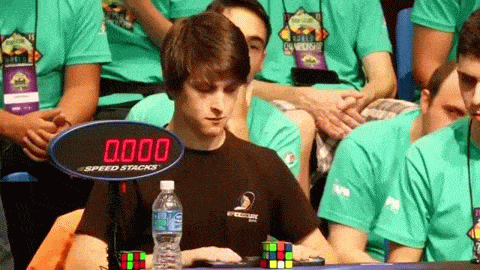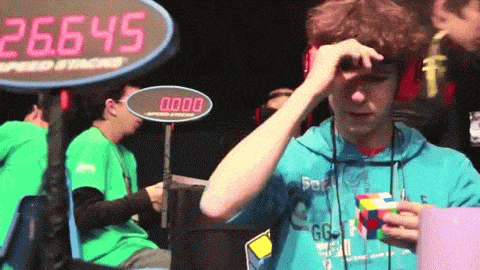Over the weekend, Feliks Zemdegs of Australia took home his second straight Rubik’s Cube world title at the 2015 Rubik’s Cube World Championship in Sao Paulo, Brazil. The 19-year-old solved the traditional three-by-three cube at an average speed of 7.56 seconds -- one time just barely missing the world record of 5.25 seconds.
The Huffington Post spoke over Skype with Zemdegs, who is an economics major at the University of Melbourne, about his tips for beginners, the types of cubers who really impress him, the stereotype about cubers that bothers him, whether the ability to solve a Rubik’s Cube is actually an indication of intelligence and much more.

Feliks Zemdegs solves a three-by-three cube.
I guess my first question is pretty straightforward: How does it feel to win two times in a row? How is it different from last time?
It feels obviously pretty special to win again. I’ve noticed in a lot of the articles they repeated some same quote about me being less nervous this time … But yeah, this time I was a lot less nervous than I was two years ago in Las Vegas, so that sort of helped.
Were you frustrated you just missed the world record? [Editor’s Note: Zemdegs solved the three-by-three cube in 5.695 seconds at the competition. The world record of 5.25 seconds was set by American Collin Burns in April.]
You can get the record at any competition. The thing about the world championship is it doesn’t matter what times you get. It just matters that you’re faster than everyone else. So there, you’re more focused on the win than the record. But the thing with the 5.69 is … I probably [could have] beaten the record if I did something slightly differently within the solve.
Did you realize that after the fact?
Yeah, immediately after I was like, “Aw, I made a mistake.” But I didn’t really care that much.
Zemdegs realized he made a mistake right after finishing this solve.
The training that you do in the weeks and months leading up to the competition -- is there anything specific that you can kind of say about your preparation that might surprise people?
Nothing too special. I mean, I think for the most part it’s just a matter of just doing lots of solves at home. I don’t really do anything special. I just sort of sit down with different puzzles and whatnot and just do sessions where I’d do maybe 100 solves on a three-by-three cube or practice different puzzles. But I don’t really train in any specific way. I know one of the other guys there actually went to a sports psychologist to sort of work on nerves and stuff, and I found that pretty interesting, but I didn’t get around to that. I dont know, I was pretty busy.
I asked a lot of colleagues what they wanted to know about you and the main thing everyone wanted me to ask is: What are one or two tricks that you really think help someone who is trying to figure out the Rubik’s Cube?
So, there is no one trick, right? For the most part, pretty much everyone who is doing these competitions has learned how to solve it off an Internet tutorial or off YouTube. When you first learn to solve the cube, I mean, anyone can learn it. It just takes a bit of practice and patience. But when you first learn how to solve it, it’s very formulaic. You know, you’ll learn you do this to solve this piece, then go to the next step and solve this piece. That’s sort of the beginner method. And then once you learn more and practice more, it becomes more intuitive.
I’m always very impressed by people who’ve figured out how to solve it by themselves, and I think that’s ridiculously difficult. I couldn’t even imagine it ... That’s one of the most impressive things. If someone’s looking to try and do that, one common tip is think of the Rubik’s Cube in terms of pieces, instead of stickers … if I had [a Rubik’s Cube lying around] you’d easily understand what I mean. But think of them in terms of pieces instead of stickers.

Do you think the ability to solve a Rubik’s cube can be proof of intelligence? Or do you think it’s just one form of intelligence? I think people look at those who can solve Rubik’s Cubes as these geniuses. Do you yourself think that?
Definitely not. That’s probably the stereotype. I mean, beginner methods are so easy to learn. Literally anyone can learn it. I think to get really fast, you obviously have to have some sort of pattern recognition, spatial awareness, finger dexterity. I’m not sure that necessarily translates to intelligence at all, but it definitely requires a spatial reasoning sort of thing. And to get fast, it [really just] requires a lot of practice and dedication.
So you don’t think the ability to solve a Rubik’s Cube is an indication of intelligence, but do you think practicing cubing makes you smarter at all?
I’m not sure. I’m not sure if there have been any studies or anything on it, but I’m sure it’s probably good brain training -- keeps your mind active, thinking and stuff like that. It’ll always be problem-solving because every single solve that you ever do will be different, right? There are almost an infinite number of combinations of the Rubik’s Cube. It’s different every time, so that requires you to come up with a different solution every single time ... So I’m sure thats probably good for the brain. But I don’t think it makes you smarter.
I was reading an interview with another Rubik’s Cube player about why there aren’t many female Rubik’s Cube players at competition. I was wondering if you had any insight into why the Rubik’s Cube world has remained so dominated by men.
It’s funny, we were sitting in the finals room, the top 16 competitors, they had us backstage, and I mentioned to someone else, “Ah, it’s all guys,” and it’s just sort of accepted, no one even has second thoughts about that … But I think it's just ‘cause it’s sort of probably just a repeating cycle. Because there are no world-class female speed cubers, it doesn’t really encourage girls to get into it, and then because they don’t get into it they don’t practice and become really, really fast. Not to say that there aren’t some great girl cubers out there. But yeah, I’m not really sure why.
Do you think cubers should be considered athletes?
Probably not. I dont think so.
What’s the most impressive Rubik’s Cube-related thing you’ve ever seen?
I’m always impressed by the blind solves, the blindfolded competition. So these guys ... they memorize the whole cube in under 10 seconds, put the blindfold on and then solve it in 10 or 15 seconds, like the top guys -- and that’s always been something that’s been very impressive to me, even as a cuber. I can only imagine what the public thinks of it.
A cuber solves a Rubik's Cube blindfolded.
Of course. It’s next level to me. How long do you think you’ll solve Rubik’s Cubes for?
For the most part, I think the top-level guys, the world-class guys, probably aged between 15 and 21, and I’m 19 at the moment, but I don’t really -- I don’t think too many people will be challenging for my speeds for the next little while. I don’t see myself stopping. We’ll see. Until I get a job or grow up or something. But the aspect that I also like is the community aspect. So I’ve met a bunch of people from all around the world. Even if I’m not the fastest anymore, I’m still going to go to the competitions to see all the friends from all around the world. But hopefully that won’t be for a little while.

Feliks Zemdegs works to solve a Rubik's Cube during the World Rubik's Cube Championship 2011 at Baiyoke Sky Hotel Friday, October 1, 2011 in Bangkok.
You seem relatively humble for a world champion, I have to be honest. Is there something about cubing in general that has made you that way, or have you just always been like that?
I think i just have always been like that. I’m generally really quiet. I don’t think Rubik’s attracts the really outspoken people, I guess. You would never see speed cubers being ridiculously arrogant, like, I’ve never encountered that at all.
Are there any sort of stereotypes about cubers that you feel are wrong or you feel are not in line with the community you’re talking about?
The one that is always in the media is -- whenever there is coverage of a competition or something -- the news is always saying, “Well, look at these geniuses. They’re so incredibly smart. I could never ever do this in a million years,” when that really isn’t the case. Anyone with a bit of patience can learn how to solve the Rubik’s Cube with lots of practice and dedication and learning and patience. You can get fast. You don’t have to be a genius or anything like that.
I only have one more specific question. Do you have a favorite Rubik’s Cube color?
I don’t know … So the thing with the Rubik’s Cube is that there are six different colors, right? And most people, they begin their solve on maybe one or two colors -- the majority of speed cubers have to begin their solves on the white side, so they start on the white at the bottom and then build it up from there. Some people have different colors; some people will start on blue or whatnot.
Then there’s a few guys who are able to start on any color because that’s how they’ve learned it from the start, and I’m one of those. It’s called “color neutrality,” so you can begin the solve on any color which gives somewhat of an advantage because you can start the solve on the easiest color. Because of that, I don’t know, I don’t really have a color. I’ll go green. Let’s go green.
The questions and answers of this interview have been edited and condensed for clarity.
Also on HuffPost:



